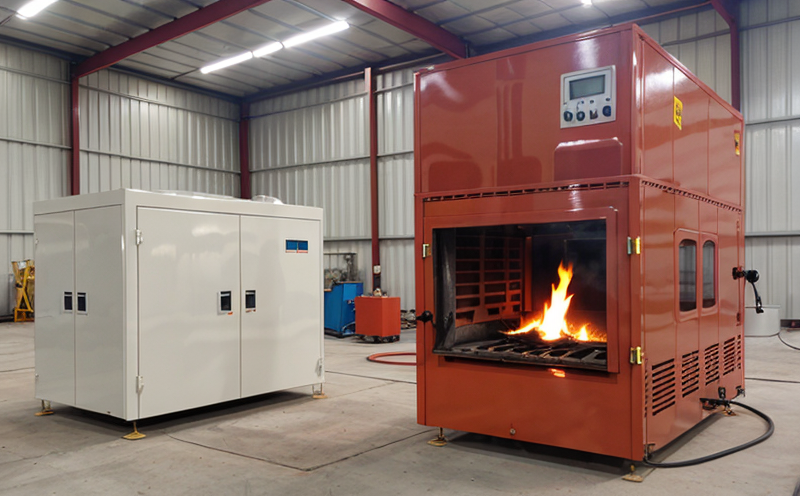ASTM C531 Thermal Expansion of Rigid Plastics and Composites
The ASTM C531 standard specifies a procedure for determining the linear thermal expansion of rigid plastics and composites over a specified temperature range. This test is particularly useful in applications where materials are subjected to varying temperatures, such as in aerospace, automotive, and electronics industries.
Thermal expansion refers to the change in size or volume of a material due to changes in its temperature. For rigid plastics and composites, understanding this property is crucial for predicting how these materials will behave under different environmental conditions. The ASTM C531 test provides precise measurements that are essential for quality control, design optimization, and ensuring product performance.
The testing procedure involves measuring the length change of a specimen as it is heated or cooled at a controlled rate. A typical setup includes a furnace or hot plate to provide uniform heating, a precision micrometer to measure length changes, and a data acquisition system to record temperature and displacement.
Specimen preparation for ASTM C531 typically involves selecting representative samples that are free from defects and have consistent geometry. The specimens should be machined to the appropriate dimensions and polished to ensure accurate measurements. Once prepared, the specimens are mounted in a fixture designed to hold them during heating or cooling.
The test procedure begins with initial equilibration of the specimen at room temperature for several hours to allow any residual stresses to relax. The temperature is then increased gradually while continuous measurements are taken. The rate of temperature change can vary depending on the material properties but is usually around 10°C per minute. Once the desired temperature range has been reached, further data points may be collected as the specimen cools back down.
The resulting thermal expansion coefficient (TEC) values are calculated from the measured length changes and reported according to ASTM C531 guidelines. These coefficients provide valuable information about a material's response to temperature variations, which is critical for applications where thermal stability is important.
In summary, ASTM C531 offers a reliable method for determining the linear thermal expansion of rigid plastics and composites. Its precise measurements enable manufacturers and researchers to make informed decisions regarding material selection and process optimization.
Why It Matters
The importance of understanding thermal expansion in rigid plastics and composites cannot be overstated, especially in industries where materials are exposed to extreme temperatures or undergo significant temperature fluctuations. Accurate knowledge of these properties ensures that products perform reliably under varying conditions.
- Product Reliability: By knowing how a material expands or contracts with temperature changes, engineers can design parts that fit together correctly and function as intended throughout their operating life.
- Cost Efficiency: Avoiding costly failures due to thermal stress through proper material selection saves time and resources in both development and production phases.
- Regulatory Compliance: Many industries, including aerospace and medical devices, must adhere to strict standards for material performance. ASTM C531 helps ensure compliance with these regulations by providing standardized testing methods.
The ability to predict how a material will behave under different temperature conditions is vital for designing durable products that meet both functional and safety requirements. Without accurate thermal expansion data, there could be significant risks associated with potential failures in critical applications.
Industry Applications
- Aerospace Industry: In aircraft manufacturing, selecting the right materials for engine parts is crucial because these components must withstand high temperatures during operation. ASTM C531 helps identify suitable rigid plastics and composites that can maintain their structural integrity at elevated temperatures.
- Automotive Sector: Vehicle interiors often experience wide temperature variations due to climate control systems. Understanding the thermal expansion of materials used in seating, dashboards, and other interior components ensures they fit properly and remain stable over time.
- Electronics Industry: Electronic devices are increasingly being miniaturized while still required to operate efficiently under various environmental conditions. ASTM C531 plays a key role in ensuring the reliability of small parts made from rigid plastics and composites used in these devices.
In addition, this test is beneficial for industries involved in manufacturing consumer goods like household appliances or sporting equipment where durability and performance are paramount.
International Acceptance and Recognition
- ASTM C531: This standard has been widely adopted by numerous countries around the world. It is recognized by international standards bodies such as ISO, IEC, and EN, ensuring consistency across different regions.
- Regulatory Bodies: Many regulatory agencies accept results from ASTM C531 tests when evaluating compliance with industry-specific requirements.
The global acceptance of ASTM C531 underscores its significance in the materials testing community. Its widespread use enhances confidence in test results and facilitates international collaboration on material science research and development projects.





